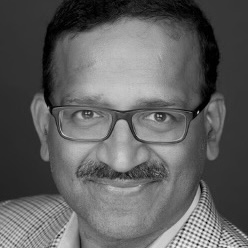Ram Mohan got into computing because the games on his brother’s early 1980s ZX Sinclair Spectrum were really terrible. He set about modifying the games first at the hex, then the binary levels, making as many changes as the 48KB console’s basic language would allow. Later, when he began to use the Internet, it was this same mix of joy and customization that drew him in, through the games and bulletin boards of the early Internet. This ability to create and shape online spaces left him with a lifelong aversion to overly controlled, so-called ‘walled garden’ platforms.
Mohan’s distinguished career sits at this intersection of the Internet’s code level and societal use. Literally: he helped expand the Internet’s reach beyond American Standard Code for Information Interchange (ASCII) that the Internet was founded on, to Unicode. ASCII limited the Internet to the letters and characters used by English speakers, whereas Unicode opened it up to billions of people to use their own languages on the Internet, enabling them to bring and engage with their own cultures online.
This push for language accessibility online is known as Universal Acceptance, and it remains a work in progress. But when Mohan first began working on it, many considered it impossible. “Harmonizing a lot of language tables and bringing them into one language table that represents an entire script, and can also represent multiple languages, all in one place? That had not been done before,” recalled Mohan.
Arabic is the second most commonly used alphabet in the world. Making it possible to use it online was critical to expanding the Internet to hundreds of millions of people. Success hinged even more on cultural and linguistic considerations than on the considerable technical challenges. Most prominent among them were the recent hostilities between Iran and Iraq. But the drive to use one’s own language and see one’s own culture represented online outweighed any tensions. Mohan convened a working group of Arab language experts and together they made Internet history. “It was a seminal moment, because it set the foundation. If you could do it for Arabic, you could do it for any language.”
As anyone whose language uses diacritics or does not use the Latin script knows, the Internet is not yet fully equal for all languages. Expanding it to billions of non-English speakers has shaped who gets to go online. But Mohan is still pushing for change, still pushing to make Universal Acceptance a reality. When asked what he would change about today’s Internet, he doesn’t hesitate: “Unicode by default. Not ASCII by default.”
Notable Professional Milestones
- In 2001, co-founded the ICANN Security and Stability Advisory Committee (SSAC), a group of technical security experts that assesses threats and risks to the Internet naming and address allocation services. Co-authored several reports on Internet resilience, including advisories on root zone wildcard bans, DNS blocking, domain hijacking prevention, and DDoS attack mitigation.
- In the late-2000s and the 2010s, while serving on the ICANN Board, built the team that developed the global language representation standard for Root Zone Language Generation Rules (RZ-LGRs) for top-level domains.
- Organized the Universal Acceptance Steering Group (UASG), a multistakeholder initiative that promotes the adoption of all domain names and email addresses, regardless of script, length, or character set.
- As Chief Technology Officer of the domain registry Afilias, led the deployment of DNS Security Extensions (DNSSEC) for more than 200 generic top-level domains (gTLDs).
- Since 2020, served as the Chief Strategy Officer for Identity Digital, a leading domain registry.
- Holds 17 Internet technology patents.
- Recipient of InfoWorld’s ‘Premier 100 Technology Leaders’ award, a CIO100 honoree, and Guinness World Record holder for organizing the largest online safety event in 2018.
- In 2025, co-founded the Coalition on Digital Impact (CODI), to ensure that every person can navigate the Internet in their own language.

